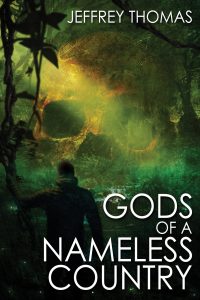
Jeffrey Thomas
JournalStone Publishing (March 1, 2024)
Reviewed by Andrew Byers
Jeffrey Thomas is an extremely prolific writer, perhaps best known for his Punktown setting and series, but he’s also written a great many stand-alone novels and unrelated story collections as well. I didn’t realize that he has also written several stories set in an isolated part of Southeast Asia called “The Unnamed Country.” Gods of a Nameless Country, a collection of two novelettes and a novella, is Thomas’ newest entry further exploring that setting and its rich past. Thomas’ other voyages to the Unnamed Country include another story collection entitled, simply, The Unnamed Country (Word Horde), the chapbook Scenes from a Village (Oddness), and the novella The Spirit of Place (Earthling Publications). While this was my first voyage to the Unnamed Country, I did not feel as though I was missing any key contextual elements.
The setting for these new stories is explicitly not Vietnam, a country that Thomas is intimately familiar with, but it is a small, insular country in Southeast Asia, wedged in between mountains and dense forests, and only just now beginning to be discovered by the outside world. While the tales included are set in the modern day, the Unnamed Country is a place steeped in its own history of gods and demons, the ruins of ancient temples, trackless forests, and beings far older than humanity. Its past is never far from its present.
What makes Gods of a Nameless Country remarkable is Thomas’ unparalleled ability to weave together elements of fantasy, horror, and cultural exploration. Drawing inspiration from Southeast Asian mythology and his own vivid imagination, Thomas crafts a richly textured world filled with ordinary citizens of the Unnamed Country—visitors to a rural temple, simple merchants, nuns, a detective with a complicated past—who are thrust into situations beyond their ken, involving jade-green tigers, intelligent wild pigs, and enigmatic shadow people more ancient (and inimical) than mankind. As the inhabitants of the Unnamed Country navigate the complexities of their society, they are confronted by the dual forces of divine benevolence and demonic tyranny, leading to a struggle for survival that is as captivating as it is harrowing.
Thomas’ prose is nothing short of mesmerizing, transporting readers to a place where the boundaries between reality and fantasy blur and anything seems possible. His vivid descriptions and evocative imagery bring the Unnamed Country to life in all its glory and darkness, immersing readers in a sensory experience that is exhilarating, unnerving, and at times, alien. From lush jungles to cities to monasteries to towering mountains, every corner of the Unnamed Country is rendered with meticulous detail, inviting readers to lose themselves in its depths and history.
But beyond its fantastical elements, Gods of a Nameless Country is also a profound exploration of culture, identity, and the human condition. Through the eyes of its diverse cast of characters, Thomas delves into themes of tradition, change, and the eternal struggle between good and evil. As the three stories included in the book unfold, readers are forced to confront their own preconceptions and beliefs, challenging them to see the world through new eyes and reconsider what it means to be a person grappling with a myriad of cultural pressures and forced to confront the intrusions of the past into modernity. Recommended.
- Book Review: BLACK SEAS OF INFINITY - July 24, 2024
- Book Review: THE SECRET LANGUAGE OF SPIDERS - July 3, 2024
- Book Review: GODS OF A NAMELESS COUNTRY - May 2, 2024
- Book Review: LIVING IN CEMETERIES - April 26, 2024
- Book Review: BABYLON TERMINAL - April 22, 2024
- Book Review: ORPHANS OF WONDERLAND - April 8, 2024
- Book Review: CHILDREN OF CHAOS - April 4, 2024
- Book Review: RAZORED LAND - April 2, 2024
- Book Review: FALLS THE DARKNESS - January 29, 2024
- Book Review: DEEP NIGHT - January 25, 2024


